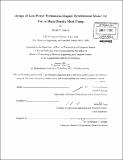Design of low-power permanent-magnet synchronous motor for use in high-density heat pump
Author(s)
Jenicek, David P. (David Pierre)
DownloadFull printable version (9.136Mb)
Other Contributors
Massachusetts Institute of Technology. Dept. of Electrical Engineering and Computer Science.
Advisor
Jeffrey H. Lang.
Terms of use
Metadata
Show full item recordAbstract
An analytical model for the functionality of a permanent-magnet synchronous motor is developed. Taking as input a specific geometry, it predicts steady-state losses of a design at an average rate of 0.85 seconds per analysis, orders of magnitude faster than existing finite-element methods. A wide design space is analyzed and, based on the necessary motor profile and manufacturing limits, an optimal design is selected. Subsequently, this motor was fabricated and integrated with a prototype design of a high-density heat pump. This application requires an unusually low motor profile - with the motor width being much (~ 10 x ) larger than its thickness - which has not been explored by other researchers. Furthermore, the design metrics specify a tight upper bound of 33.3 W on available power. Electrical characteristics are modeled and tested to determine optimal phase-excitation waveforms. Finally, power electronics with a sensorless control scheme are designed and incorporated using a custom-designed printed circuit board at an all-inclusive cost of under $50, which is well below the price of typical development control boards used to test prototype motors. Speeds of up to 7000 RPM were observed. At the design point of 5000 RPM, the motor delivered 35 mN-m of torque and drew 23.8 W of power, significantly below the available power budget.
Description
Thesis (M. Eng.)--Massachusetts Institute of Technology, Dept. of Electrical Engineering and Computer Science, 2011. Cataloged from PDF version of thesis. Includes bibliographical references (p. 63).
Date issued
2011Department
Massachusetts Institute of Technology. Department of Electrical Engineering and Computer SciencePublisher
Massachusetts Institute of Technology
Keywords
Electrical Engineering and Computer Science.